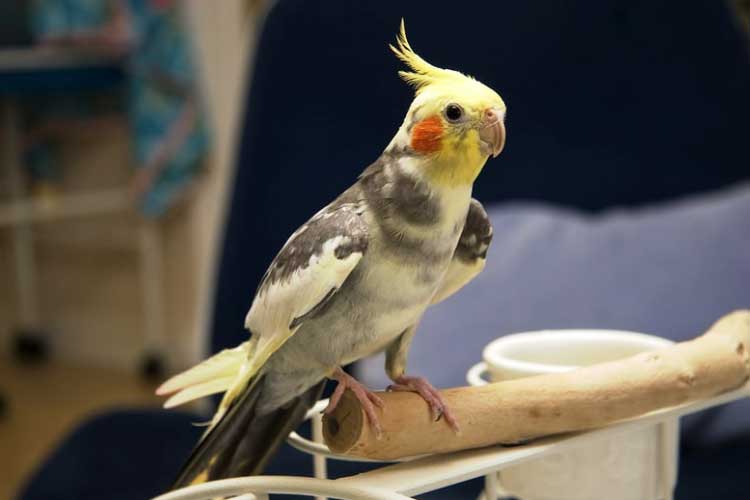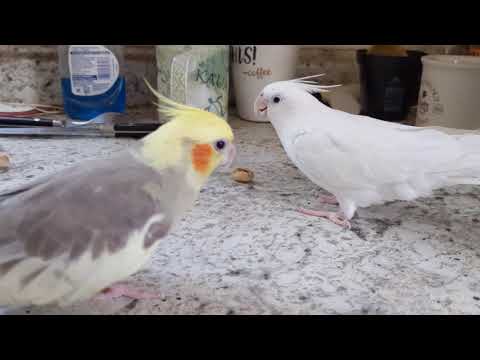Pet birds can eat nearly all types of nuts, including pistachios. After all, nuts are very yummy and contain healthy nutrients like fiber, fatty acids, essential vitamins, and proteins. But what about cockatiels?
Can cockatiels eat pistachios? This is a common question, and the answer is yes. Cockatiels can eat raw and roasted pistachios as long as the nuts don’t contain added salt, flavors, or sugar content. But while cockatiels can eat pistachios, you must feed them in moderation to avoid health issues.
So, how many pistachios should your cockatiels eat? And how do you prepare the nuts? Stay here to find out the answers to all your questions and much more.
Can You Feed Pistachios to Cockatiels?
Of course, you can. This is because, like many nuts, pistachios are also very nutrient-rich. They are rich in vitamins, protein, dietary fiber, and fatty acids. Even better, they contain a variety of mineral blocks and vitamins, thereby constituting a balanced diet. As such, they make a great and healthy snack for cockatiels when raw and roasted.
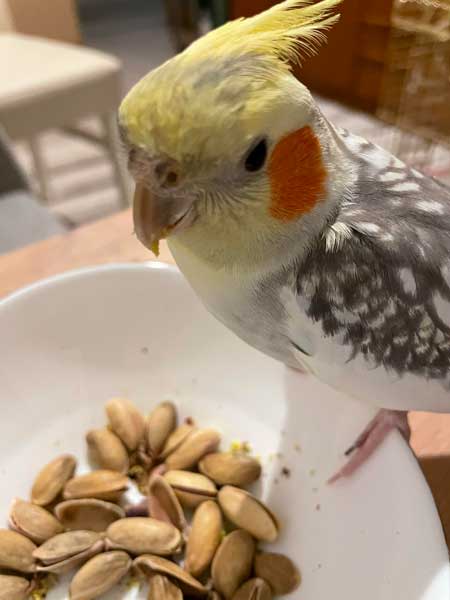
Speaking about pistachios being nutrient-rich, in the table below, you can find the nutrition facts of these cashew nuts.
| Key Nutrients (Serving Size: 100g) | Amount Per Serving |
| Carbohydrates | 27.65 g |
| Protein | 22.35 g |
| Fiber | 10.3 g |
| Fat | 45.97 g |
| Sugar | 7.81 g |
| Magnesium | 120 mg |
| Iron | 4.2 mg |
| Calcium | 110 mg |
| Vitamin B1 | 0.84 mg |
| Vitamin B2 | 0.158 mg |
| Vitamin B3 | 1.425 mg |
| Vitamin C | 2.3 mg |
| Vitamin B6 | 1.274 mg |
| Potassium | 1042 mg |
From our table above, it is evident that pistachios are an excellent source of fiber and protein. Therefore, feeding these nuts to your cockatiels can help provide them with pure energy. But like with any snack, your cockatiels should only eat pistachios in moderation.
You just feed them the soft inner part of the nut and discard the tough outer pistachio shell. This is because while the exterior is not unsafe to eat, it lacks any essential nutrients.
Now, while your feathery friends can eat this occasional treat, you must never give if they are salted. Salty foods could make these bird species suffer from dehydration and many more health problems. But if you accidentally give salted nuts, make sure your cockatiels drink lots of fresh water to keep them hydrated.
Also, you should avoid sweetened pistachios with added artificial colors or flavors. The added sugars may lead to gastrointestinal distress. So, in other words, you can only feed unsweetened and unsalted pistachio nuts to your feathered companions.
Do Cockatiels Like Pistachios?
Cockatiels like eating nuts in general. So, most cockatiels also take delight in eating pistachios. This is probably because these tasty treats are super delicious with a mild flavor that cockatiels find a little sweet.
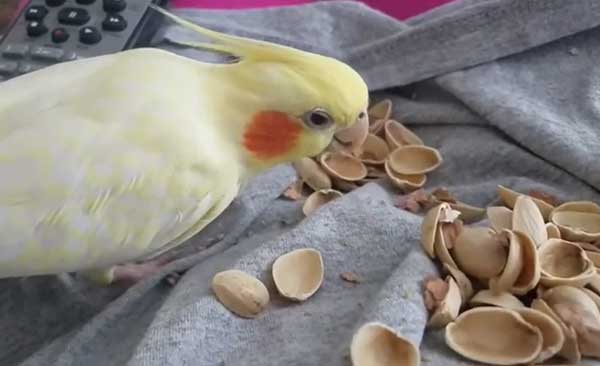
Health Benefits For Cockatiels Eating Pistachios
Plain pistachios are nutrient-dense and high in healthy fats. As such, there are many health benefits for cockatiels eating this type of nut. Some of these health benefits are:
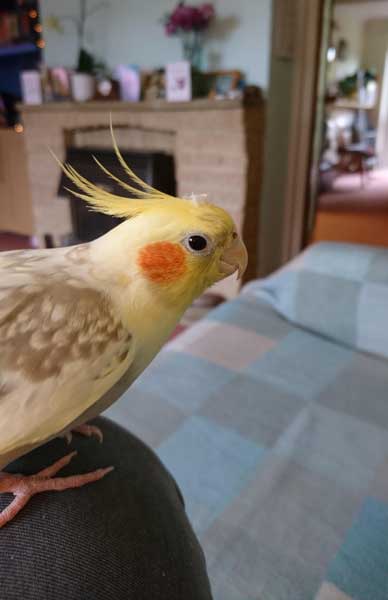
- Regulating your bird’s mood
- Promotes overall digestions
- Strengthens your pet’s muscles and beak
- Reduces inflammation
- Provides cockatiels with pure energy
- Boosts heart health and the overall bird’s immunity
- Lowers cholesterol levels and blood pressure
How Much Pistachios Should Cockatiels Eat?
You should not feed your cockatiels more than a few pistachios a day. Just one or two nuts a day is enough. More so, you must limit the intake to a few times a week. Otherwise, larger birds may suffer from obesity from consuming too many pistachios.
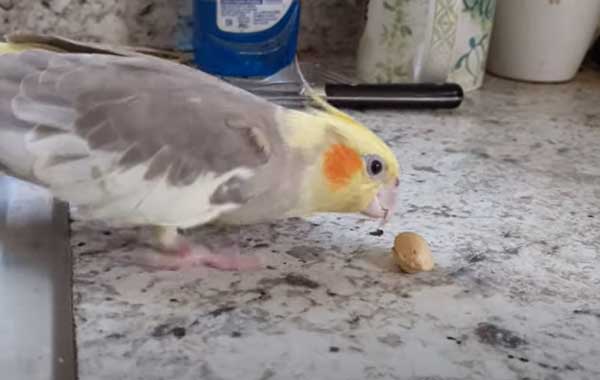
How Do You Prepare Pistachios for Cockatiels?
First, remove the outer shell and then the inner membrane. You can just tear off the membrane in chunks. Then, bake the pistachio meat for 5 to 6 minutes at 350-degree Fahrenheit. Once the nuts have cooled completely, give a few to your feathery friend.
Can You Feed Pistachios to Baby Cockatiels? If so, how?
Yes. However, you must crush the pistachios into smaller pieces and hand-feed them to the baby parakeets. This is because baby cockatiels don’t have powerful beaks to crack the nuts.
Now, check out this video of two cockatiels enjoying pistachios on the kitchen countertop.
Any Risks of Feeding Pistachios to Cockatiels?
Pistachios are safe if you feed your cockatiels in moderation. However, eating too many of these kinds of nuts could make your bird obese. This is because the nuts have a fair amount of fat content. In addition, giving salted pistachios to your feathered companions may lead to dehydration.
FAQ
Now let’s walk you through some commonly asked questions about cockatiels eating pistachios.
Besides pistachios, your feathered companions can eat a wide variety of nuts such as hazelnuts, almonds, walnuts, cashews, and pecans.
Cockatiels can eat both raw and roasted pistachios. However, roasted nuts are a healthier option because they contain less fat than raw pistachios.
Conclusion
Pistachios are very healthy treats and offer many nutritional benefits. Therefore, you can safely feed the nuts to your cockatiels either roasted or raw. Even baby cockatiels can eat this delicious treat. Just make sure your birds eat them in moderation.
Do you know if your cockatiels can eat spinach or blueberries? Read our articles about it to learn more.
